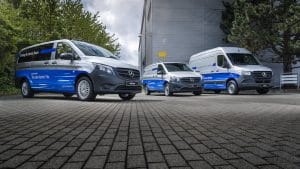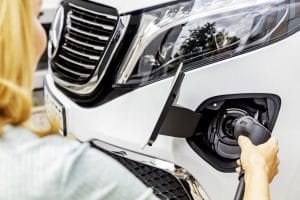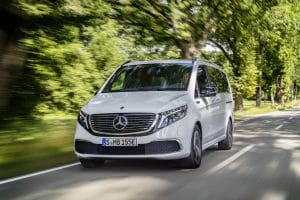With sales of its diesel-powered vans declining, Mercedes-Benz will begin sales the EQV, an all-electric van early in 2020, company officials revealed.
The technical highlights for the new EQV include a range of 405 kilometers or about 240 miles and the rapid charging of the high-voltage battery from 10 to 80% in less than an hour. The Mercedes-Benz EQV also offers more comfort in the interior and unparalleled flexibility. Customers can also choose between two different wheelbases, according to Marcus Breitschwerdt, head of Mercedes-Benz Vans.
“Our MPVs meet the highest standards in terms of functionality and variability. The EQV also does not compromise in this respect. It offers comfortable handling, dynamic electro-aesthetics, intuitive operation and generous space – and all locally emissions-free,” Breitschwerdt said.
(Mercedes-Benz Concept EQV is Near Production-Ready Electric Minivan)
“It offers all of the typical qualities of the brand and segment that our customers expect, whether as a family car or a shuttle vehicle with a lounge-like character,” he added.
Breitschwerdt also told Reuters he expected 15% to 25% of van sales by 2025 to be fully electric variants in the passenger segment and that he would consider diversifying the cell supplier base to ensure a sufficient supply of batteries as production ramps up.
He also said that although autonomous driving was possible from a technological point of view, the business models for operating autonomous vehicles were not yet proven.
Meanwhile, the company’s Iberian subsidiary for MAN Truck & Bus announced it has begun accepting orders for its eTGE, an all-electric light-commercial vehicle.
The first deliveries of the MAN vehicle for the regional market in Spain and Portugal are forecast for early 2020 amid high demand for zero-emissions LCVs stemming from tough new clean-air regulations major European cities are enacting.
(Cost of Dieselgate Continues to Rise for Daimler)
The rules across Europe are designed to curtail the use of vehicles powered by internal-combustion engines in city centers.
Statistics show 70% of LCVs used in urban areas travel on average less than 60 miles (100 km) per day at a low average speed and with many starts and stops. This is the environment in which German commercial-vehicles maker MAN is introducing the eTGE.
Production of the electric version of the TGE range of vans began in July 2018 at MAN facilities in Wrzesnia, Poland.
The Man eTGE runs on accumulated electricity in its lithium-ion battery packs that powers a three-phase synchronous motor mounted directly on the front axle, assisted by a single-speed gearbox.
This engine provides a maximum 134 horsepower with a maintained 67 hp and 214 lb.-ft. (290 Nm) of torque that is reached in a few seconds.
(Diesel Recall Forces Daimler to Revise Earnings Outlook)
The electric van has a theoretical range of up to 108 miles (173 km), according to NEDC standards, a distance MAN engineers say is enough to cover about two-thirds of all urban routes carried out by ICE vehicles.



